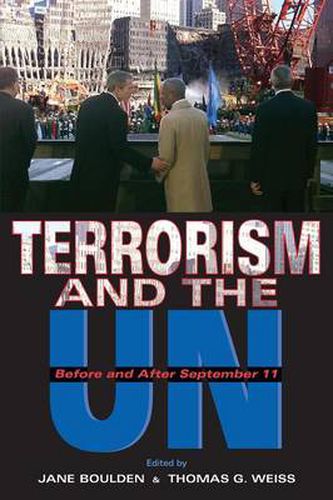Readings Newsletter
Become a Readings Member to make your shopping experience even easier.
Sign in or sign up for free!
You’re not far away from qualifying for FREE standard shipping within Australia
You’ve qualified for FREE standard shipping within Australia
The cart is loading…






This title is printed to order. This book may have been self-published. If so, we cannot guarantee the quality of the content. In the main most books will have gone through the editing process however some may not. We therefore suggest that you be aware of this before ordering this book. If in doubt check either the author or publisher’s details as we are unable to accept any returns unless they are faulty. Please contact us if you have any questions.
How has the United Nations dealt with the question of terrorism before and after September 11? What does it mean that the UN itself has become a target of terrorism? Terrorism and the UN analyses how the UN’s role in dealing with terrorism has been shaped over the years by the international system, and how events such as September 11 and the American intervention in Iraq have reoriented its approach to terrorism. The first half of the book addresses the international context. Chapters in this part consider the impact of September 11 on the UN’s concern for the rights and security of states relative to those of individuals, as well as the changing attitudes of various Western powers toward multilateral vs. unilateral approaches to international problems. The second half of the book focuses more closely on the UN, its values, mechanisms, and history and its future role in preventing and reacting to terrorism. The Security Council’s position on and reactions to terrorist activities are contrasted with the General Assembly’s approach to these issues. What role the UN might play in suppressing the political economy of terrorism is considered.A concluding chapter looks at broader, more proactive strategies for addressing the root causes of terrorism, with an emphasis on social justice as a key to conflict prevention, a primary concern of the UN, particularly the General Assembly, before September 11. Contributors are Jane Boulden, Chantal de Jonge Oudraat (Georgetown University), Edward C. Luck (Columbia University), S. Neil MacFarlane (University of Oxford), Rama Mani (Geneva Centre for Security Policy), M. J. Peterson (University of Massachusetts, Amherst), Nico Schrijver (Vrije Universiteit, Amsterdam), Monica Serrano (Colegio de Mexico and University of Oxford), Thierry Tardy (Geneva Centre for Security Policy), Karin von Hippel (King’s College, London), and Thomas G. Weiss.
$9.00 standard shipping within Australia
FREE standard shipping within Australia for orders over $100.00
Express & International shipping calculated at checkout
This title is printed to order. This book may have been self-published. If so, we cannot guarantee the quality of the content. In the main most books will have gone through the editing process however some may not. We therefore suggest that you be aware of this before ordering this book. If in doubt check either the author or publisher’s details as we are unable to accept any returns unless they are faulty. Please contact us if you have any questions.
How has the United Nations dealt with the question of terrorism before and after September 11? What does it mean that the UN itself has become a target of terrorism? Terrorism and the UN analyses how the UN’s role in dealing with terrorism has been shaped over the years by the international system, and how events such as September 11 and the American intervention in Iraq have reoriented its approach to terrorism. The first half of the book addresses the international context. Chapters in this part consider the impact of September 11 on the UN’s concern for the rights and security of states relative to those of individuals, as well as the changing attitudes of various Western powers toward multilateral vs. unilateral approaches to international problems. The second half of the book focuses more closely on the UN, its values, mechanisms, and history and its future role in preventing and reacting to terrorism. The Security Council’s position on and reactions to terrorist activities are contrasted with the General Assembly’s approach to these issues. What role the UN might play in suppressing the political economy of terrorism is considered.A concluding chapter looks at broader, more proactive strategies for addressing the root causes of terrorism, with an emphasis on social justice as a key to conflict prevention, a primary concern of the UN, particularly the General Assembly, before September 11. Contributors are Jane Boulden, Chantal de Jonge Oudraat (Georgetown University), Edward C. Luck (Columbia University), S. Neil MacFarlane (University of Oxford), Rama Mani (Geneva Centre for Security Policy), M. J. Peterson (University of Massachusetts, Amherst), Nico Schrijver (Vrije Universiteit, Amsterdam), Monica Serrano (Colegio de Mexico and University of Oxford), Thierry Tardy (Geneva Centre for Security Policy), Karin von Hippel (King’s College, London), and Thomas G. Weiss.